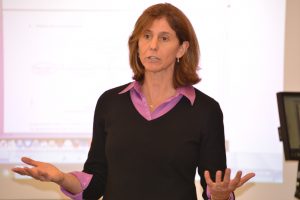EDLR’s Dr. Preston Green was quoted in the LA School Report on how research shows that charter schools do best for California’s low-income and minority students, which is leading state officials to consider slowing their expansion.
Our Faculty
AERA Announces New Editor Team to Take Helm of Educational Researchers
AERA announces the new editor team which includes EDLR’s Sarah Woulfin, who serve as a coeditor of Educational Researcher for the 2020–2022 volume years.
The War on Women Coaches
EDLR’s Dr. Laura Burton co-authors original commentary on women in sport by The Conversation
Research Shows That Charters Do Best for California’s Low-Income and Minority Students. Now Lawmakers There Want to Slow Their Expansion
RESEARCH Series: Community Partnerships

On the topic of community partnerships, Drs. Jennifer McGarry and Justin Evanovich strongly agree: relationships must be the priority. McGarry and Evanovich co-direct Husky Sport, a campus-community partnership between UConn’s Neag School of Education and a community in Hartford’s North End that uses sport and nutrition education to promote equity, empowerment, and growth, both for students in Hartford and at UConn.
The partnership as a whole, which has been going strong for nearly sixteen years now, has never been a “top-down” experience, says McGarry: “It has been community relationships from the beginning. It was never ‘this is what we do, can we do it at your school?’ It was getting to know kids, families, teachers and coaches in other spaces– in afterschool and weekend programs, in community sports– and starting from there. The partnership was built slowly and intentionally with the kids, the families, and eventually the teachers.”
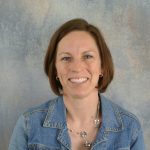
Since 2005, the project has been generously grant-funded by the U.S. Department of Agriculture’s SNAP-Ed program, and currently Husky Sport is present in the North End of Hartford six days a week leading in-school, after-school, and weekend programming. While the in-school programming takes place at the Fred D. Wish Museum School, Husky Sport staff and students also lead programs at multiple after-school and weekend partner sites such as the Hartford Catholic Worker and Salvation Army North End Corps.
Partnerships such as this incorporate many different components, including research, but Evanovich emphasizes that research cannot be the core directive if equity is the goal. “Genuine community partnerships and research can easily be in conflict with one another,” he says. “We have to put relationships first, we can’t lead with research. If we did, we’d be putting the university, the college students, and the faculty at risk of being exploitative. We have to own that risk and actively fight against it, and that starts with valuing the voices of people in the community, with prioritizing their goals. We want quality experiences and opportunities to be there for the young people; if we’re not placing that first, we can lose the focus of what it is we’re trying to do.”
With this understanding in mind, the research that does take place within the Husky Sport program is carefully and intentionally facilitated. The research falls into three main areas. The first focuses on the Hartford students’ experience with the various Husky Sport programs, as well as the experience of their families, and uses a sport-based youth development framework. The second line of research focuses on the experience of UConn college student participants in a critical service learning framework. The final area focuses on the campus-community partnership itself, which is a topic of increasing interest in campuses and communities around the country. “The research, much like the partnership, is always evolving,” says McGarry. “With our college-student-focused research, for example, we used to use a service learning framework, but we’re now emphasizing more of a critical service learning approach. We hope this research impacts the way people understand and problematize service.”
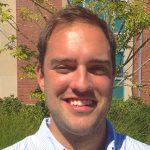
Another important aspect of the partnership is internal assessment, an area in which Evanovich feels they have made great strides over the years. “Firstly, a lot of our ‘assessment’ is informal, it’s in our everyday relationships. Lots of exchanges of ‘how did it go, how did you like this, what would you like to see?’ It’s a process of analysis that’s part of the everyday fabric of our partnership,” says Evanovich. “And when we do conduct more formal assessment, we’ve made huge improvements. We try never to have students sit in their seats and complete a survey using a pencil. Everything’s active: it aligns with our Husky Sport pillars of activity. Everyone’s up and moving, placing stickers, competing in relay races– it’s fun and engaging.” Evanovich credits many of these improvements to the learning that took place during an exchange program between UConn and the University of Western Cape in South Africa. “Folks from UConn were able to go to communities in the Western Cape and see those techniques being implemented,” says Evanovich. “And we’re still growing: now we’re working on faster turnaround for change based on feedback from kids, teachers, and families.”
The partnership has faced its fair share of challenges since its inception in 2003. “Navigating changes that are out of our control can be difficult,” says McGarry. “Husky Sport is affected by shifts in leadership in the school, the university, the city, and even the state and federal governments. At one point, the school we had been at for about nine years closed, and then those students were reassigned to three different schools, and we had to split our program up among multiple locations. Then the following year, those students were shifted back into one school. It forces us to be creative; we changed our strategies and approaches and found ways to make things work. It can be challenging, but when we figure it out it can be very rewarding.”
Like any good partnership, Husky Sport is always a work in progress.
“We are always learning,” says Evanovich. “With everything we do, we can’t just be a university coming in from the outside as experts. The community we’re partnered with is within a six-block radius, and it’s full of love and care and skill and hard work, but it’s also systemically and historically oppressed. We can’t run disconnected youth development programs; we can’t talk about food that people can’t access, we can’t talk about sports that people can’t play. We have to make sure we prioritize the talents, the strengths, and the realities that the people in this community bring to the table every day.”
Looking ahead, McGarry and Evanovich hope to improve and expand the partnership while staying in the same community. They are currently in the conceptual stages of a partnership with Neag’s Integrated Bachelor’s/Master’s Teacher Education Program which would bring more Neag students to Fred D. Wish School, and they are also preparing for more change: the Wish School’s student body is about to grow, and it will shift from being a K-8 to a PreK-5 school. Both McGarry and Evanovich point to their fellow Neag faculty and staff as leaders in community-based research, partnership, and change. “We have many talented folks as colleagues,” says Evanovich. “Their ongoing support and collaboration is vital to Husky Sport.” The Department of Educational Leadership is proud to support Husky Sport’s work toward equitable, community-led, positive change in Hartford, Storrs, and beyond.
Silence, Power and Privilege in the Classroom
Last week, Drs. Milagros Castillo-Montoya and Erica Fernández, two EDLR faculty members who are connected with UConn’s El Foco research community, organized and supported Dr. Gilda Laura Ochoa, the featured guest speaker who joined UConn’s faculty, staff and students for an engaging discussion on education, during the annual plática. The event pushed participants to identify power, privilege and silences within the classroom and encouraged students to be successful while and reminding teachers to be mindful.
Read the full story by The Daily Campus.
Courses and Curriculum: EDLR 3345
Courses and Curriculum: EDLR 5105
UConn’s Department of Educational Leadership (EDLR) offers a rich and diverse curriculum that prepares both undergraduate and graduate students to be educational leaders in our ever-changing world. The “Courses and Curriculum” series highlights innovative courses within EDLR’s catalog that are changing the education game for the better.
The Department of Educational Leadership’s (EDLR) master’s program in Higher Education and Student Affairs (HESA) boasts a robust curriculum that prepares students to be well-rounded and reflective student affairs practitioners. EDLR 5105: Structured Group Dialogue in Student Affairs is both an innovative and integral part of the HESA curriculum, giving students a space to consider how dialogue, and intergroup dialogue specifically, can be a tool to explore their own racial identity and socialization, as well as the identities and processes of socialization of others. Students in the course are continually asked to reflect on the personal, professional, and educational implications of their learning. These insights and processes help the students learn how to dialogue with others who have varying perspectives given their own identities and socialization– a much-needed process on college campuses today.
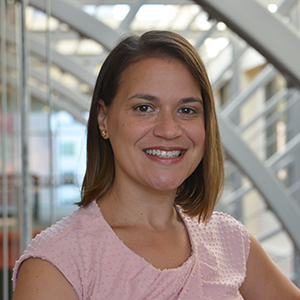
Students in EDLR 5105 engage in dialogue with each other as an entire class as well as in smaller, intra-class groups. One of the major aspects of the course is the Intergroup Collaboration Project (ICP), which, as the closing project for the course, encourages action as a result of learning. Students work alongside their cohort members in assigned groups to create visual representations of their learning, specifically around race and intergroup dialogue in student affairs practice. Through the ICP projects, students dialogue across differences to arrive at an understanding of that year’s selected theme: in 2016, the theme was “allyship;” in 2017 it was “social responsibility;” and in 2018 it was “disrupting race talk.” These visual representations are then shared with the larger UConn community in the form of a HESA Gallery Walk, which engages the larger UConn community in dialogue about race and higher education.
The course is co-taught by Dr. Milagros Castillo-Montoya (she/her/hers) and Danielle DeRosa (she/her/hers). It was Castillo-Montoya who lead the charge several years ago to update HESA’s existing groups-based course. As part of her research on teaching in higher education, she had begun to explore intergroup dialogue, and in the winter of 2015 she was part of a six-person UConn delegation that attended the University of Michigan’s intergroup dialogue training program. Upon her return, she worked with the department chair to incorporate her valuable training into the course, which was first offered in its renovated form in the fall of 2016. The course, which follows the University of Michigan model, is co-taught by design: its two instructors have different social identities which are aligned with focus of the course. In UConn HESA’s case, the central focus of the course is race.
The course is divided into four phases: Forming and Building Relationships, Exploring Differences and Commonalities of Experience, Exploring and Dialoguing About Contentious Issues, and Alliance Building and Social Responsibility. In each phase, says DeRosa, students are both learners and teachers: “My favorite part of teaching this course is learning with and from our students. Students in the HESA program think deeply about the ways in which college campuses can be more inclusive. As a community, we are each able to contribute from our own unique perspectives and lived experiences.”
Castillo-Montoya reaffirms the importance of bringing one’s unique identities and experiences to the course. “My lived experience as a Latina, first-generation college graduate from a low-income background informs my teaching of this course. So does my research expertise in teaching and learning in higher education,” says Castillo-Montoya. “From these experiences, I understand that the content of the course isn’t something ‘out there’ to be learned; it is inside each of us as we unpack our own assumptions and understandings about ourselves, others, and society relative to race. Then we can consider how those things impact our practice”
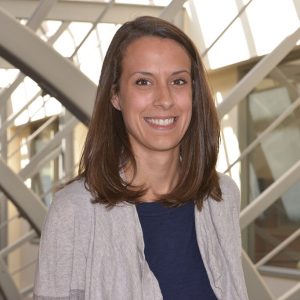
For DeRosa, her experience working with Husky Sport, a campus-community partnership between UConn and a community in the North End of Hartford, has been important to her ability to complexly and responsibly co-teach this course. “I have had to examine my own positionality as a white woman engaged in work in a neighborhood mostly comprised of people of color. I’ve had to do a lot of the work that we are asking our students to do in the course, and this is work that I continue to invest in; the process of learning about and unlearning our own socialization never ends. It can be helpful to share the journey of understanding my own racial identity as I connect with students.”
Kayla Moses (she/her/hers, HESA ‘20), a student in the course this past fall, says she has learned a great deal about the impact of socialization and the power of her identity. “Within the context of this course, I became more aware of how the world around us, along with our personal stories, can impact the way that we think and develop,” says Moses. “I became more aware of my position as a woman of color and how that has affected my learning. This course allowed me to not only expand my understanding of how my identity can help me relate to my current and future students of color, but also to realize that sharing the load with white peers and colleagues is the only way that this work can be done effectively.”
Fellow student Steven Feldman (he/him/his, HESA ‘20) says that the course opened his eyes to important differences between one-on-one and group dialogue. “In one-on-one conversations, it is more difficult to avoid or disengage from conversations about race, but in group conversations, it is easier to fall into racialized scripts of behavior,” says Feldman. “When this happens, white folks like me tend to stay silent either because we do not feel like we have the tools to talk about race yet or because we are experiencing the discomfort of talking about race. This course challenged me to reflect on my identities and consider the consequences of my words and behaviors in group contexts.”
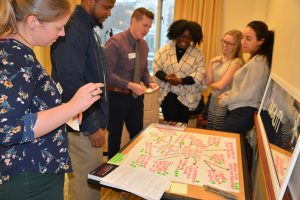
Castillo-Montoya and DeRosa, who just completed their third year teaching this course together, say it was their best co-teaching semester yet. Along with several of their students, they recently presented on the course at the 2019 ACPA (College Student Educators International) Annual Convention in Boston, Massachusetts. “Having this course makes UConn HESA one of only a handful of programs in the country that includes education on intergroup dialogue as part of their curriculum for future higher education and student affairs practitioners,” says Castillo-Montoya. “Practitioners in the field are increasingly competent in social justice and inclusion, and we want our graduates to be well prepared for their work with diverse students on diverse college campuses.”
“EDLR as a department has supported the development of this course from the outset,” says department head Dr. Jennifer McGarry. “We sent several faculty members to participate in the intergroup dialogue training at the University of Michigan, supported time and space to share about that experience, and encouraged the faculty who took part to integrate their learning with other opportunities to study, participate in, and lead dialogue about race. EDLR is committed to the course, the instructors, and the students: we see this teaching and learning as integral to who we are and what we value.” EDLR 5105 aligns with the Department of Educational Leadership’s mission to “inspire and cultivate innovative leaders for positive change” and Neag’s mission to develop leaders dedicated to improving education for all. The Department of Educational Leadership is proud to have talented teachers such as Dr. Milagros Castillo-Montoya and Danielle DeRosa doing the important work of opening and deepening dialogue on college campuses and beyond.
Neag School Accolades – February-March 2019
Congratulations to our Neag School alumni, faculty, staff, and students on their continued accomplishments inside and outside the classroom, outlined in this month’s issue of Neag School Accolades.
Joseph Cooper Releases New Book: From Exploitation Back to Empowerment
The Neag School of Education covers Sport Management’s Dr. Joseph Cooper, who recently released a new book, From Exploitation Back to Empowerment: Black Male Holistic (Under)Development Through Sport and (Mis)Education which was inspired by his research on the intersection between sport, education, race, and culture and the impact of sport involvement on the holistic development of Black male athletes. Read the full story here.
